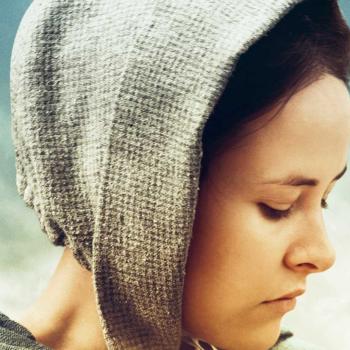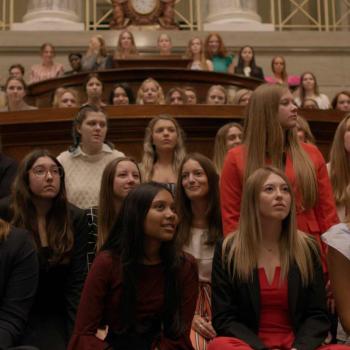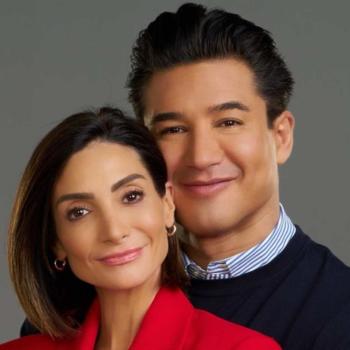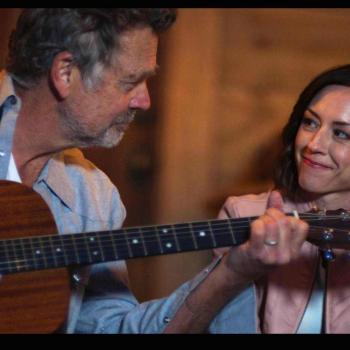Two couples bound together by tragedy meet in a church basement to unpack their feelings and understand each other in the new Bleecker Street release, “Mass,” releasing this week. Jason Isaacs, Martha Plimpton, Reed Birney, and Ann Dowd star in the film, the brainchild of writer and first-time feature film director Fran Kranz.

Kranz, who has appeared in “Homecoming,” “Cabin the Woods” and “Dollhouse,” wrote the screenplay as a response to numerous school shootings that rocked the nation. Troubled by the frequency and trying to understand how to stop the violence, he discovered the Truth and Reconciliation Commission in South Africa, a series of hearings designed to help understand the violence perpetrated during apartheid.
“While I was amazed and inspired, I was also really troubled by it, because I did not think I could do it,” he said. “I did not think I could forgive in that situation in a situation like that. I was reading about these meetings, these people trying to meet to heal, possibly forgive or possibly reconcile. They were meeting in a way to move forward. And it struck me as something so extraordinary.”
He began the screenplay, admittedly “obsessed” with the concept of pursuing forgiveness in a way to end violence, but never fully realizing the subject he would be tackling as a first-time director.
“I’d never done it before, so I was first time everything,” he said. “(People might say) ‘Maybe this was too big for your first film.’ That idea was never with me. It just I just had to do it. People now will comment or ask about that, and it makes me —it’s sort of a lovely thought I understand— but it makes me uncomfortable because it never occurred to me one way or the other. I just felt so compelled.”
Whether or not the film will inspire others to act forgivingly is another subject entirely.
“We are increasingly more divided,” he said. “I worry because we normalize hating people we don’t know. We believe that people can’t change and if we don’t allow for redemption or reparation, what is the point? These ideas scare me terribly. I worry about the country my daughter will grow up into. That’s what felt to me so necessary about telling the story the way I told it.”
Dowd, an Emmy Award-winning actress lauded for her roles on “The Leftovers” and “Handmaid’s Tale,” appears as Linda, perhaps the most broken and humble of the four parents. It’s Linda’s demeanor and candor that literally begins making cracks in the walls built by anger.
“This woman, to her great credit, has come to a realization that most don’t in life because they’re not put in circumstances that will teach them this,” she added. “That is that everything that came before is over. Life as we knew it is gone, shattered. She is in a broken place . . . and deciding to move forward in her life. With the profound awareness and acceptance that ‘This is my life now.’ To me, it means you can move forward, and you can put yourself there without any excuses, without any anger, only trying to hear them and answer their questions.”
While “Mass” focuses on an extreme tragedy, Dowd also relates how normal, everyday discussions on politics or religion can sometimes divide. She and her cousin, who found themselves on opposite sides of the spectrum politically and continually disagreed with what they believe Jesus actually said and meant, had a coming-together recently. Like the four parents in the story, it was driven in part by tragedy.
“His father died, my uncle, a beautiful man,” she explained. “And my sweet dear cousin came to the door and I looked in his eyes, and he was broken. No anchor. My cousin had emotional struggles, and his father had always been by his side, and that was gone. I just saw in his eyes. So now we refer to each other as brother and sister. I said, ‘This is where we’re going, you and me; we’re brother and sister.’ So, we stay away from all that stuff. We love each other. And he’s beautiful. What’s my point? You just recognize profound loss, and then, all his defenses, all his anger was gone.”
Kranz added, “We all suffer. When you can see, when you can feel some sense of shared suffering, it leads to connection. It’s shared humanity. There’s credibility and legitimacy to suffering. It’s a way for them to see the human being and not the person they blame and not just the person they hate, and not just the person they’re at odds with.”
Ultimately, the writer-director says the movie is about realizing that other people are inherently human and worthy of love and compassion. He referenced the story of St. Francis, who encountered a leper in the street, then got off his horse and held the leper and kissed him.
“He embraces this thing that he fears, he embraces this thing he abhors and is afraid of and disgusted by it, but he chooses to embrace,” he said. “How well can we ever know each other, but how hard do we really try? Forcing some kind of human connection, despite your differences, puts forgiveness, an entirely different subject, in an entirely different conversation.”
“Mass,” written and directed by Fran Kranz, opened in limited release Friday and will expand in wide release Oct. 15.
Watch an exclusive video interview with Fran Kranz and Ann Dowd below:












